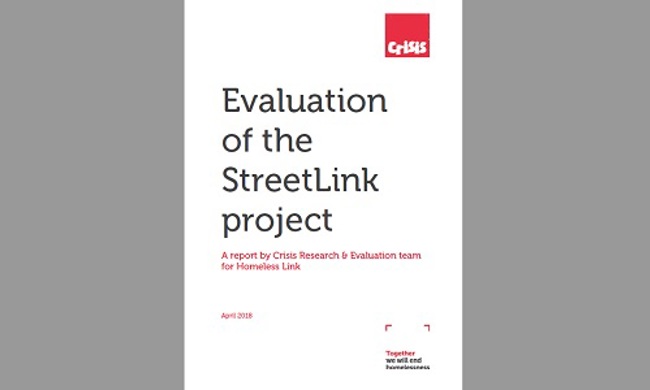Evaluation of the StreetLink project (2018)
13.04.2018
This report presents the findings from an independent evaluation of the StreetLink project, conducted by the Crisis Research & Evaluation team for Homeless Link. StreetLink, the service designed to help the public to connect a person sleeping rough with local services, was launched in England in 2012. Funded by grants from the Ministry for Housing, Communities and Local Government, the Greater London Authority and, from January 2016 when the service expanded in Wales, the Welsh Government. StreetLink is run in partnership between Homeless Link and St Mungo's. The evaluation set out to assess the project against its original objectives to improve the response to individual rough sleepers, and the wider local systems that support rough sleepers off the streets, and in particular the extent to which StreetLink:
- Provides the public with a means to take appropriate action when they see someone sleeping rough
- Provides early intelligence to local homelessness services about new rough sleepers
- Helps get rough sleepers off the streets faster
- Highlights good practice and helps to improve systems for dealing with rough sleeping
Key findings
- Most members of the public who have used StreetLink in England and Wales have a positive overall impression of it, and believe that it is a quick and easy way for members of the public to connect a rough sleeper with relevant local services.
- There was consensus across different stakeholder groups regarding a lack of awareness about the existence of StreetLink amongst members of the public and others (businesses, community groups, etc.).
- StreetLink is being used regularly by a variety of different groups in addition to members of the public for whom it was originally designed, including rough sleepers themselves to self-refer, by homelessness organisations to refer their clients, by other organisations where homeless people may present (e.g. food banks), and even by local authority Housing Options teams to refer people who present as homeless to them. The perception of StreetLink amongst those homeless people who have used it to self-refer in England and Wales is less positive than among members of the public.
- The extent to which local authorities use StreetLink to direct their work varies greatly between local authority areas. This ranges from outreach teams being commissioned to be largely directed by StreetLink referrals, to outreach teams who additionally have their own phone number to receive referrals.
- Outreach teams which use StreetLink in England consider it to be effective in enabling them to find and support new rough sleepers, and the majority of both outreach teams and local authorities feel that StreetLink is providing them with early intelligence about new rough sleepers.
- The main challenges with using StreetLink for outreach teams and local authorities are poor quality referrals, including duplicate referrals and insufficient information with which to be able to find people.
- Discussions with national stakeholders found that the effectiveness of StreetLink to get rough sleepers off the streets faster was difficult to ascertain. While it was generally recognised that StreetLink did provide a means to identify new rough sleepers, whether it resulted in them getting off the street quicker was less clear.
- The evaluation has demonstrated that StreetLink is understood and is implemented in a range of ways across different operational markets. The impact of this is that the effectiveness of the platform is reliant on the extent to which it is advertised and promoted in local areas, how StreetLink interacts with commissioned outreach services, local authority strategy and practices, and how it is used by people experiencing homelessness and other homelessness services.
- In many of the case study areas, StreetLink is viewed as an intelligence tool that can help the local authority and commissioned outreach services to identify new rough sleepers or those hidden from view about whom they would otherwise not know.
- The interviews, surveys and ideation workshops carried out as part of the evaluation demonstrated an appetite to maximise the potential of StreetLink and improve and develop current service delivery.
Reference
Moisl, E., Albanese, F., Sanders, B., Leith, G., Rahman, L. and Sutton-Hamilton, C. (2018) Evaluation of the StreetLink project. London: Crisis.

